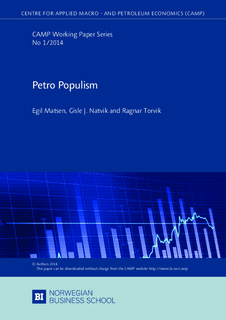| dc.contributor.author | Matsen, Egil | |
| dc.contributor.author | Natvik, Gisle J. | |
| dc.contributor.author | Torvik, Ragnar | |
| dc.date.accessioned | 2014-06-24T12:54:12Z | |
| dc.date.available | 2014-06-24T12:54:12Z | |
| dc.date.issued | 2014 | |
| dc.identifier.issn | 1892-2198 | |
| dc.identifier.uri | http://hdl.handle.net/11250/196697 | |
| dc.description.abstract | We aim to explain petro populism|the excessive use of oil revenues to buy political support.
To reap the full gains of natural resource income politicians need to remain in office over time.
Hence, even a rent-seeking incumbent who prioritizes his own welfare above that of citizens,
will want to provide voters with goods and services if it promotes his probability of remaining
in office. While this incentive benefits citizens under the rule of rent-seekers, it also has the
adverse effect of motivating benevolent policymakers to short-term overprovision of goods and
services. In equilibrium politicians of all types indulge in excessive resource extraction, while
voters reward policies they realize cannot be sustained over time. | nb_NO |
| dc.language.iso | eng | nb_NO |
| dc.publisher | BI Norwegian Business School | nb_NO |
| dc.relation.ispartofseries | CAMP Working Paper Series;1/2014 | |
| dc.title | Petro Populism | nb_NO |
| dc.type | Working paper | nb_NO |
| dc.source.pagenumber | 31 pages | nb_NO |
